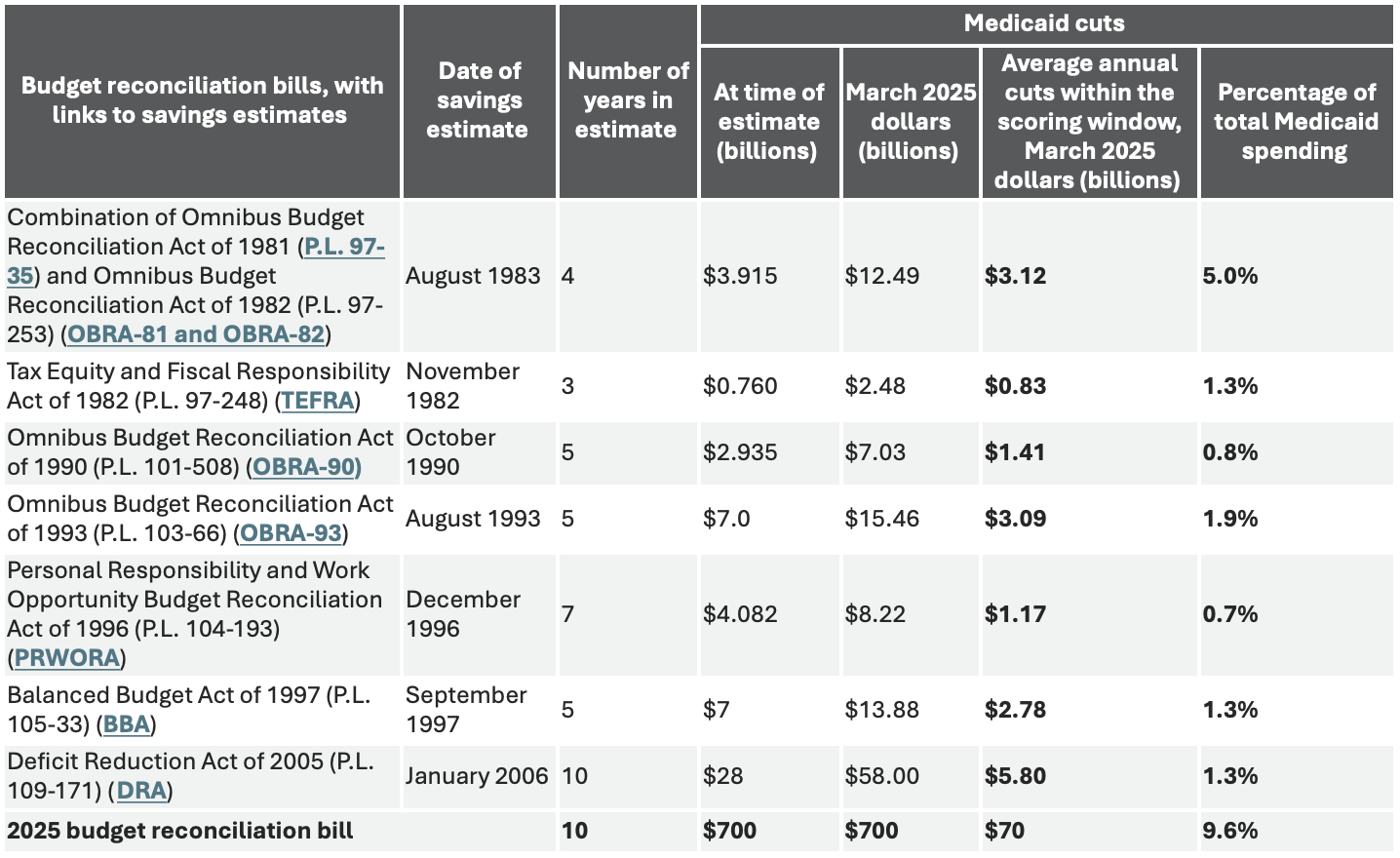(UnidosUS) —
By Stan Dorn, Director, Health Policy Project, UnidosUS
If budget reconciliation legislation proposed in the House Energy and Commerce Committee becomes law, Medicaid would be cut by at least $700 billion—the largest Medicaid cut in American history. The $715 billion preliminary estimate from the non-partisan Congressional Budget Office (CBO) includes cuts to other health programs, in addition to Medicaid cuts.
It is not plausible to claim, as some suggest, that cuts of such historic magnitude could be made by reducing “waste, fraud and abuse” and trimming the program’s “useless fat.” The budget reconciliation bill would cut into the program’s core. According to preliminary estimates from the CBO, the legislation’s Medicaid provisions would terminate health insurance for 8.6 million people. That would limit their access to essential health care and leave them exposed to potentially ruinous medical bills. People of all backgrounds would have their lives upended, but Latino families would suffer particularly deep harm. Together with other aspects of budget reconciliation, including the Ways and Means Committee’s decision not to extend enhanced premium tax credits that now help people buy ACA health insurance, at least 13.7 million additional people would be uninsured because of the proposed legislation.
Keep up with the latest from UnidosUS
Sign up for the weekly UnidosUS Action Network newsletter delivered every Thursday.
If the budget reconciliation bill passes in its current form, Medicaid cuts would far exceed any previously made in U.S. history. Eight past budget reconciliation bills that cut Medicaid have been scored by the Congressional Budget Office (CBO), passed by Congress and signed into law. Due to differences in the number of years covered by the Congressional Budget Office’s ‘scoring window’ for each bill, the total Medicaid cuts in past legislation can’t be directly compared to the 10-year reduction estimated under the current budget reconciliation bill. However, two metrics make a reasonable comparison possible, despite scoring windows of different sizes: average annual Medicaid cuts during the applicable scoring window, in constant dollars and the percentage of total Medicaid spending cut by the legislation during the scoring window.
Using either metric, the current budget reconciliation bill’s Medicaid cuts would vastly exceed any past Medicaid cut ever signed into law (Table 1):
- The $70 billion average annual Medicaid cut under the current legislation would be more than 10 times the size of the largest previous cut, the Deficit Reduction Act of 2005’s average annual reduction of $5.8 billion in March 2025 dollars.
- The current bill’s 9.6% drop in projected Medicaid spending would be roughly twice the size of the largest previous percentage drop that resulted from two sequential budget reconciliation bills added together—namely, the 5.0% Medicaid spending reduction that resulted from the Omnibus Budget Reconciliation Acts (OBRA) of 1981 and 1982. According to the Reagan Administration’s official evaluation, the latter legislation caused a 13% drop in total Medicaid coverage.
Table 1. Past Medicaid cuts vs. the current budget reconciliation proposal
 Notes:
Notes:
(1) Past savings estimates were updated from the month of the applicable CBO score to March 2025 dollars by using the BLS Inflation Calculator.
(2) To estimate the impact of a $700 billion Medicaid cut, as a percentage of total Medicaid spending over CBO’s 10-year scoring window, the cut was compared to baseline CBO projections for federal Medicaid costs in FY 2025-2034.
(3) To estimate past laws’ impact, as a percentage of total federal Medicaid spending, the percentage cut made by OBRA-81 and OBRA-82 was calculated by CBO. For other legislation, the saving estimate for each year was adjusted, based on the BLS Inflation Calculator, into the equivalent dollar amount in December of the year being estimated. For example, the OBRA-93 estimate of Medicaid savings in 1995 was translated from dollars in August 1993, when CBO published its score, to dollars in December 1995. The sum of Medicaid cuts adjusted in that way was then compared to baseline federal Medicaid spending as shown in CMS’s Historical National Health Expenditure reports. For the BBA, that was not possible, since CBO presented a net Medicaid savings figure for five years, without stating net Medicaid savings for each year. The BBA estimate displayed here therefore overestimates the percentage impact on total Medicaid spending by updating the scored five-year savings amount based on inflation through December 2002, the final year of the CBO scoring window for BBA.
For additional information about the methodology used to develop these estimates, including methodological limitations, please contact Stan Dorn at UnidosUS, [email protected].
Such unprecedented Medicaid cuts would harm millions of people of all races and ethnicities. But Latinos are especially likely to work at low-wage jobs that do not provide health benefits, so Hispanic families would suffer particularly widespread harm:
- Medicaid provides health insurance to 20.3 million Hispanic Americans — nearly a third of the entire Latino community.
- More than half of all Hispanic children rely on Medicaid for their health care.
- Medicaid covers almost 3 in 10 Latino elders, age 65 and older, many of whom need Medicaid for critical long-term services and supports.
Medicaid is a crucial lifeline for America. The budget reconciliation bill would cut this lifeline for millions of people, including hard-working Hispanic families. It would terminate their health insurance, increase the burden of health care costs they must shoulder and gravely impair their access to essential health care.
The proposed Medicaid cuts would be historic, and not in a good way. All of America, including the country’s Latino families, will be watching carefully to see whether Congress agrees to the House Energy and Commerce Committee’s budget reconciliation proposal for major cuts to the health care system on which tens of millions of working and middle-class people rely.
—
Read More News from UnidosUS
